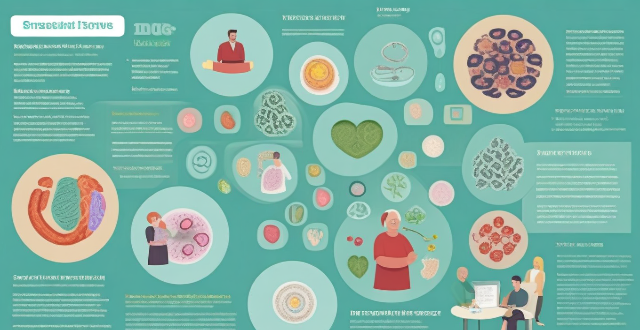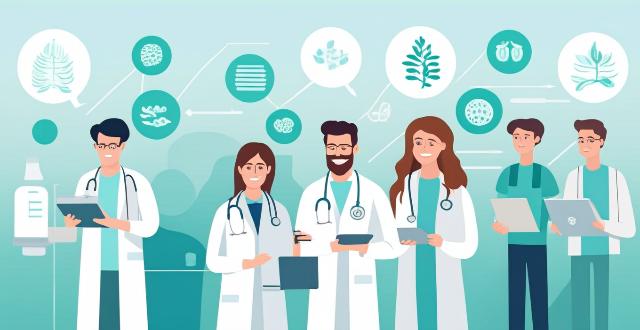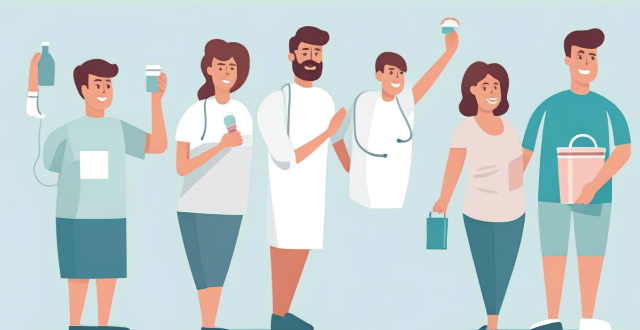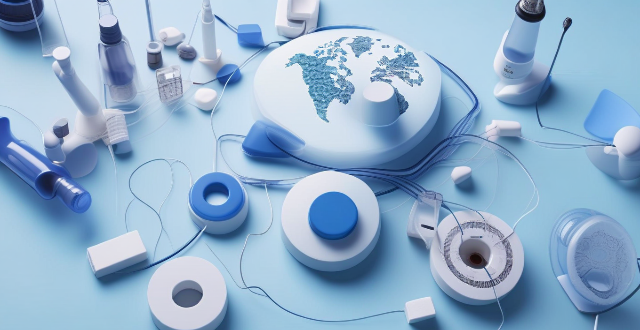Health Care

How does telemedicine improve patient care and access to health services ?
Telemedicine improves patient care and access to health services by increasing accessibility for both rural and urban patients, enhancing continuity of care, offering cost efficiency, providing a better patient experience through personalized care and convenience, and enabling data-driven decision making.

What are some effective strategies for managing chronic conditions as part of personal health care ?
Managing chronic conditions requires a combination of self-care, education, lifestyle changes, and support from others. Developing a self-care plan, educating yourself about your condition, making healthy lifestyle choices, and seeking support from family and friends are all effective strategies for managing chronic conditions. By taking an active role in managing your symptoms and communicating effectively with your healthcare team, you can improve your overall quality of life and reduce the impact of your condition on your daily activities.

How can I improve my personal health ?
Improving personal health involves a holistic approach that includes dietary habits, physical activity, mental well-being, and preventive care. Here's how to enhance your overall health: 1. **Dietary Habits**: Consume a balanced diet with fruits, vegetables, whole grains, lean proteins, and limited processed foods. Stay hydrated and practice mindful eating. 2. **Physical Activity**: Engage in regular exercise, including cardiovascular activities, strength training, and flexibility exercises. Adopt an active lifestyle by taking stairs and walking or biking short distances. 3. **Mental Well-being**: Manage stress through relaxation techniques, hobbies, and seeking professional help if needed. Ensure quality sleep and maintain positive thinking. 4. **Preventive Care**: Visit healthcare providers for regular check-ups and stay up to date with screenings and vaccinations. Make healthy lifestyle choices and be environmentally aware. Consistency is crucial, so start small and gradually build upon these practices to improve your personal health and well-being.

How can we promote self-care and self-love for women's mental health ?
Promoting self-care and self-love for women's mental health requires a comprehensive approach that includes creating awareness, providing resources, and establishing supportive environments. This involves understanding the importance of mental health, dispelling misconceptions, normalizing conversations, providing accessible information, offering therapeutic support, building community networks, implementing workplace initiatives, advocating for policies, encouraging mindfulness and meditation, promoting healthy lifestyle habits, and fostering self-reflection and growth. By adopting these strategies, we can empower women to take charge of their mental health and lead fulfilling lives.

How has the COVID-19 pandemic affected global health ?
The COVID-19 pandemic has significantly impacted global health by increasing infection and mortality rates, straining healthcare systems, causing mental health concerns, affecting healthcare economics, prompting public health policies and responses, and potentially causing long-term effects.

What are the key components of a women's health check-up ?
A women's health check-up is vital for maintaining good health and preventing diseases. It includes a general health assessment, reproductive health screenings, sexual health evaluations, mental health assessments, lifestyle habit reviews, and preventive care measures. The key components cover medical history, physical examination, menstrual history, pelvic exam, contraception, STI testing, HPV vaccination, psychological assessment, support services, dietary habits, exercise routine, substance use, immunization updates, and cancer screening. Addressing these areas ensures that healthcare providers can offer appropriate care and guidance tailored to each woman's unique needs.

What impact has electronic health records had on the efficiency of medical practices ?
Electronic health records (EHRs) have revolutionized the healthcare industry by providing a digital platform for storing, managing, and exchanging patient information. This has led to significant improvements in the efficiency of medical practices. In this article, we will discuss the various ways in which EHRs have impacted the efficiency of medical practices. Benefits of Electronic Health Records: - Improved accessibility with faster retrieval and remote access - Enhanced communication through secure messaging and patient portals - Streamlined workflow with automated tasks and reduced paperwork - Improved quality of care with error reduction and clinical decision support - Data analysis and reporting simplified by data mining and regulatory compliance Challenges Faced with Electronic Health Records: - High implementation costs and staff training requirements - Interoperability issues and data exchange challenges - Security concerns related to data breaches and privacy protection In conclusion, electronic health records have had a significant impact on the efficiency of medical practices by improving accessibility, enhancing communication, streamlining workflow, improving quality of care, and simplifying data analysis and reporting. However, challenges such as cost, training, interoperability issues, and security concerns must be addressed to fully realize the potential benefits of EHRs in healthcare settings.

What are the best practices for women's health maintenance ?
The text outlines best practices for women's health maintenance, emphasizing regular check-ups and screenings, healthy eating habits, physical activity, mental health care, reproductive health, preventive measures, and lifestyle choices. The article suggests annual wellness visits, pap smears and HPV tests, mammograms, breast self-exams, a balanced diet with plenty of water and limited processed foods, regular exercise including strength training and flexibility exercises, stress management, adequate sleep, social support, professional help for mental health concerns, discussion of birth control options, menstrual hygiene, pregnancy care, staying up to date on immunizations, sun protection, safe sex practices, limiting alcohol, avoiding smoking, and steering clear of illicit drugs. These recommendations are intended to help women maintain their health and wellbeing throughout their lives, with the caveat that individual circumstances and needs should guide healthcare decisions in conjunction with professional advice.

Do sports rehabilitation centers offer preventative care to avoid future injuries ?
Sports rehabilitation centers play a crucial role in offering preventative care services to help individuals avoid future injuries. They provide comprehensive assessments, customized exercise programs, education and training, utilize advanced equipment and technology, and collaborate with healthcare professionals to improve overall health and reduce the risk of re-injury.

How can we strengthen the capacity of healthcare systems in low-income countries to address global health threats ?
This article discusses strategies to improve healthcare systems in low-income countries to tackle global health threats. It covers infrastructure development, human resource development, technology and innovation, partnerships and collaboration, preventive care and public health initiatives, financing and sustainability, and research and development. The article emphasizes the need for a multifaceted approach involving various stakeholders to achieve equitable healthcare for all.

What role does access to healthcare play in mitigating the health effects of climate change ?
The text discusses the role of healthcare accessibility in mitigating the health effects of climate change. It highlights the importance of preventive care, emergency response, and chronic disease management in reducing vulnerability to climate-related health risks. The text also explores direct and indirect effects of climate change on human health, such as heat-related illnesses, respiratory issues, vector-borne diseases, mental health impacts, nutritional impacts, and displacement and migration. Finally, it suggests adaptation strategies for healthcare systems, including building resilient infrastructure, integrating climate change considerations into public health systems, and training community health workers on climate change impacts.

How do I provide care for someone experiencing anaphylactic shock ?
Anaphylactic shock is a severe allergic reaction that requires immediate care. To provide care for someone experiencing it, recognize the symptoms like skin reactions and respiratory distress, call for emergency help, use an epinephrine auto-injector if available, position the person comfortably, loosen tight clothing, keep them calm, monitor vital signs, and follow instructions from emergency personnel. Timely action can greatly improve the chances of recovery.

How has the COVID-19 pandemic impacted global health security ?
The COVID-19 pandemic has significantly impacted global health security by overwhelming healthcare systems, necessitating public health policies such as lockdowns and quarantine measures, and highlighting the importance of international cooperation. The strain on healthcare systems included increased patient loads, shortages of medical supplies, and stress on the healthcare workforce. Public health responses involved vaccination programs, testing and tracing initiatives, and economic challenges due to lockdowns. International cooperation was essential for coordinating a global response, sharing information, and addressing misinformation. The pandemic also highlighted the need for resilient global health systems, sustained investment in public health infrastructure, collaborative research, and technological advancements. Overall, the COVID-19 crisis has prompted efforts to build stronger and more cooperative global health systems prepared for future emergencies.

Are there any natural or organic feminine care products available in the market ?
Natural and organic feminine care products have become increasingly popular as consumers seek gentler, chemical-free options for their personal hygiene. These products include natural deodorants, organic tampons and pads, shampoos and soaps made with plant-based ingredients, herbal remedies for menstrual pain relief, dietary supplements to support hormonal balance, and skincare solutions for feminine areas. By choosing these products, individuals can prioritize their health while also supporting sustainable practices in the beauty industry.

What role do healthcare workers play in effective pandemic management ?
The role of healthcare workers in effective pandemic management includes diagnosis and treatment, prevention and control measures, contact tracing and testing, vaccination programs, mental health support, and collaboration with other healthcare professionals. Their expertise and dedication are crucial in reducing the spread of the virus and improving patient outcomes.

How can we ensure equitable access to healthcare during pandemic management ?
The article emphasizes the significance of equitable healthcare access during pandemics like COVID-19. It outlines various strategies to achieve this goal, including implementing universal health coverage, utilizing community health workers, expanding telehealth services, managing supply chains efficiently, conducting public education campaigns, providing financial support to vulnerable groups, and fostering collaborative partnerships. These measures aim to ensure that everyone has equal opportunities to receive medical care, regardless of their socio-economic status, race, ethnicity, or geographic location.

What precautions should women take during menstrual health care ?
Women should maintain good hygiene, use appropriate sanitWomen should maintain good hygiene, use appropriate sanithydrated, exercise regularly, use appropriate sanitary products, stay hydrated, exercise regularly, manage stress, eat a healthy diet, and seek medical help when needed during menstrual health care.

How do I care for and maintain my luxury purchases ?
This guide offers comprehensive advice on how to care for various luxury items, including designer handbags, fine jewelry, high-end watches, leather goods, and shoes/apparel. It emphasizes the importance of following manufacturer's instructions, proper storage, gentle handling, regular maintenance, and insurance. Specific tips are provided for each type of luxury item, such as cleaning methods, protection against water damage, and professional check-ups. The guide also suggests avoiding harsh chemicals, focusing on quality over quantity, and seeking professional help for specialized care. By implementing these strategies, individuals can maintain the beauty and functionality of their luxury purchases for years to come.

How has technology revolutionized the healthcare industry ?
The healthcare industry has been transformed by advancements in technology, including electronic health records, telemedicine, wearable devices, medical imaging tools, and robotic surgery. These innovations have improved efficiency, expanded access to care, and enhanced patient outcomes. As technology continues to evolve, it will play an increasingly important role in shaping the future of healthcare.

What impact do immigration policies have on the healthcare system ?
Immigration policies can significantly impact a country's healthcare system, affecting access to care, quality of care, and cost of care. Legal immigrants may face eligibility restrictions for public health programs and language barriers, while undocumented immigrants may fear deportation and lack health insurance. Cultural competency is crucial for healthcare providers, and diversity in medical education is important. Financial burdens on hospitals and economic contributions from immigrants also play a role. Policymakers should consider these implications when crafting immigration legislation to create a stronger healthcare system for all members of society.

How to care for and maintain your sports fashion garments ?
Sporting fashion garments are designed to be both stylish and functional, but they also require special care to maintain their quality and appearance. Here are some tips on how to properly care for and maintain your sports fashion garments: Washing instructions include reading the label, sorting clothes, using a gentle detergent, hand washing or machine washing on delicate cycle, and avoiding tumble drying. Maintenance tips include storing properly, avoiding ironing, spot cleaning stains, rotating garments, and repairing tears and holes. By following these care and maintenance tips, you can extend the lifespan of your sports fashion garments and keep them looking their best for years to come.

How are robotics changing surgery and patient care in hospitals ?
The integration of robotics in hospitals is revolutionizing surgery and patient care by enhancing precision, reducing recovery time, increasing accessibility to specialized care, improving training and education, streamlining operations, and fostering personalized medicine. Robotic-assisted surgery offers greater accuracy and minimally invasive techniques, leading to quicker healing and less trauma for patients. Telerobotic surgery expands access to expert care across geographical barriers. Simulation technologies provide a safe environment for surgical practice and the development of new techniques. Automation improves hospital efficiency, from dispensing systems to record management. Personalized medicine is facilitated through customized treatment plans tailored to individual patient needs. Overall, robotics is transforming healthcare delivery, making it more efficient, effective, and accessible.

How can women ensure they have access to medical care and support in case of illness or injury while traveling ?
How Can Women Ensure They Have Access to Medical Care and Support in Case of Illness or Injury While Traveling? Traveling can be an exciting adventure, but it's important to ensure that you have access to medical care and support in case of illness or injury. Here are some tips for women to ensure they have access to medical care while traveling: 1. Research Before You Go: Before embarking on your journey, research the local healthcare system and facilities. Look for hospitals, clinics, and pharmacies in the area you will be visiting. Make a list of emergency numbers and keep them with you at all times. 2. Get Travel Insurance: Consider purchasing travel insurance that includes medical coverage. This will give you peace of mind knowing that you are covered in case of an unexpected illness or injury. 3. Pack a First Aid Kit: Pack a first aid kit with essential items such as bandages, antiseptic wipes, pain relievers, and any prescription medications you may need. It's also a good idea to bring along copies of your prescriptions in case you need to refill them while traveling. 4. Stay Healthy: Take steps to stay healthy while traveling. Wash your hands frequently, eat nutritious meals, drink plenty of water, and get enough sleep. Avoid risky behaviors such as excessive alcohol consumption or participating in dangerous activities without proper safety gear. 5. Seek Help When Needed: If you do become ill or injured while traveling, don't hesitate to seek medical attention. Many countries have English-speaking doctors and nurses who can provide assistance. If you are unable to communicate effectively with local healthcare providers, consider using translation services or seeking out expatriate communities for support. In conclusion, ensuring access to medical care and support while traveling is crucial for women's health and safety. By doing your research beforehand, getting travel insurance, packing a first aid kit, staying healthy, and seeking help when needed, you can enjoy your travels with peace of mind knowing that you are prepared for any potential emergencies.

What strategies can women use to prioritize their mental health while balancing work and family responsibilities ?
This text discusses the importance of prioritizing mental health for women, especially while they are juggling work and family responsibilities. It provides several strategies to help achieve a healthy work-life balance, including developing a self-care routine, setting boundaries, building support systems, managing time effectively, and engaging in self-reflection and growth activities. The text emphasizes that taking care of oneself is not selfish but essential for maintaining overall well-being and happiness.

What are the key indicators of good personal health ?
Good personal health involves taking care of both physical and mental well-being. Key indicators include regular exercise, a balanced diet, adequate sleep, stress management, regular check-ups, and mental well-being. By focusing on these aspects, you can lead a fulfilling life with improved overall health and well-being.

How can educational psychology aid in addressing students' mental health issues ?
Educational psychology can aid in addressing students' mental health issues by understanding the role of emotional intelligence, promoting a positive school climate, providing early intervention and support services, encouraging self-care and resilience, and facilitating collaboration between educators and mental health professionals.

What is the importance of mental health in global health initiatives ?
This document discusses the importance of mental health in global health initiatives. It explains why mental health matters and how it affects physical health, economic stability, and social outcomes. The document also discusses how mental health affects global health initiatives and emphasizes the need for culturally sensitive approaches to address mental health issues sustainably.

What are the most innovative applications of technology in the healthcare industry ?
The healthcare industry has seen significant advancements due to innovative applications of technology. Telemedicine allows patients remote access to care, reducing travel time and increasing efficiency. Wearable devices track health metrics, promoting healthy habits. AI and machine learning analyze medical data for accurate diagnoses and personalized treatments. Robotic surgery systems enhance precision in minimally invasive procedures. Blockchain technology secures sensitive medical data sharing among providers.

How can we reduce the burden of non-communicable diseases worldwide ?
Non-communicable diseases (NCDs) account for 71% of global deaths, including cardiovascular diseases, cancers, chronic respiratory diseases, and diabetes. Reducing their burden is essential for better health outcomes and lower healthcare costs. Key strategies include promoting healthy lifestyles, early detection, media campaigns, tobacco control policies, alcohol taxation, sugar taxes, strengthening primary care, training health professionals, integrated care models, funding research, digital health solutions, pharmaceutical innovation, international cooperation, public-private partnerships, community engagement, increased funding, insurance coverage, and cost-effective interventions. These measures require collaboration from governments, civil society, the private sector, and individuals to foster a supportive environment for good health and assist those with NCDs.